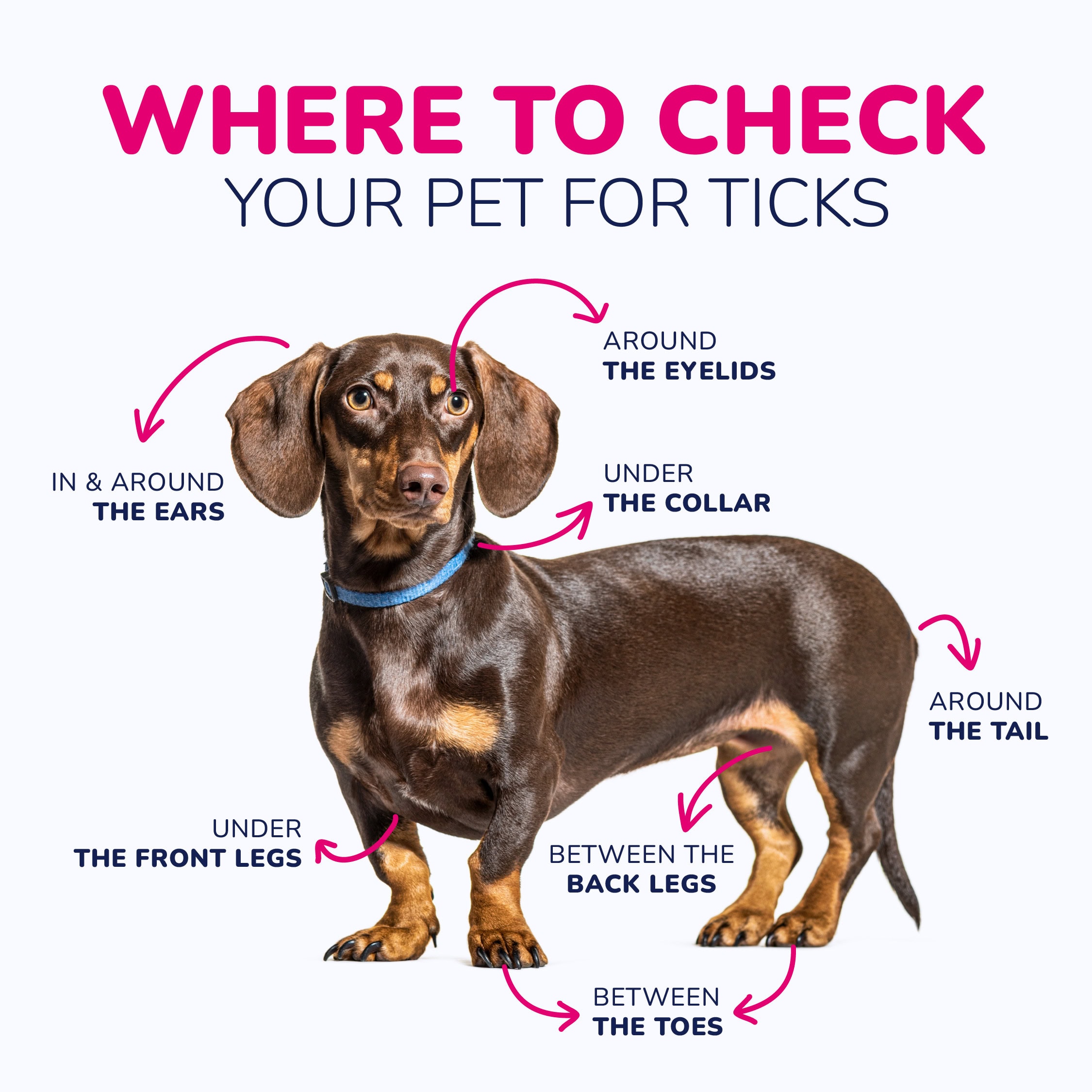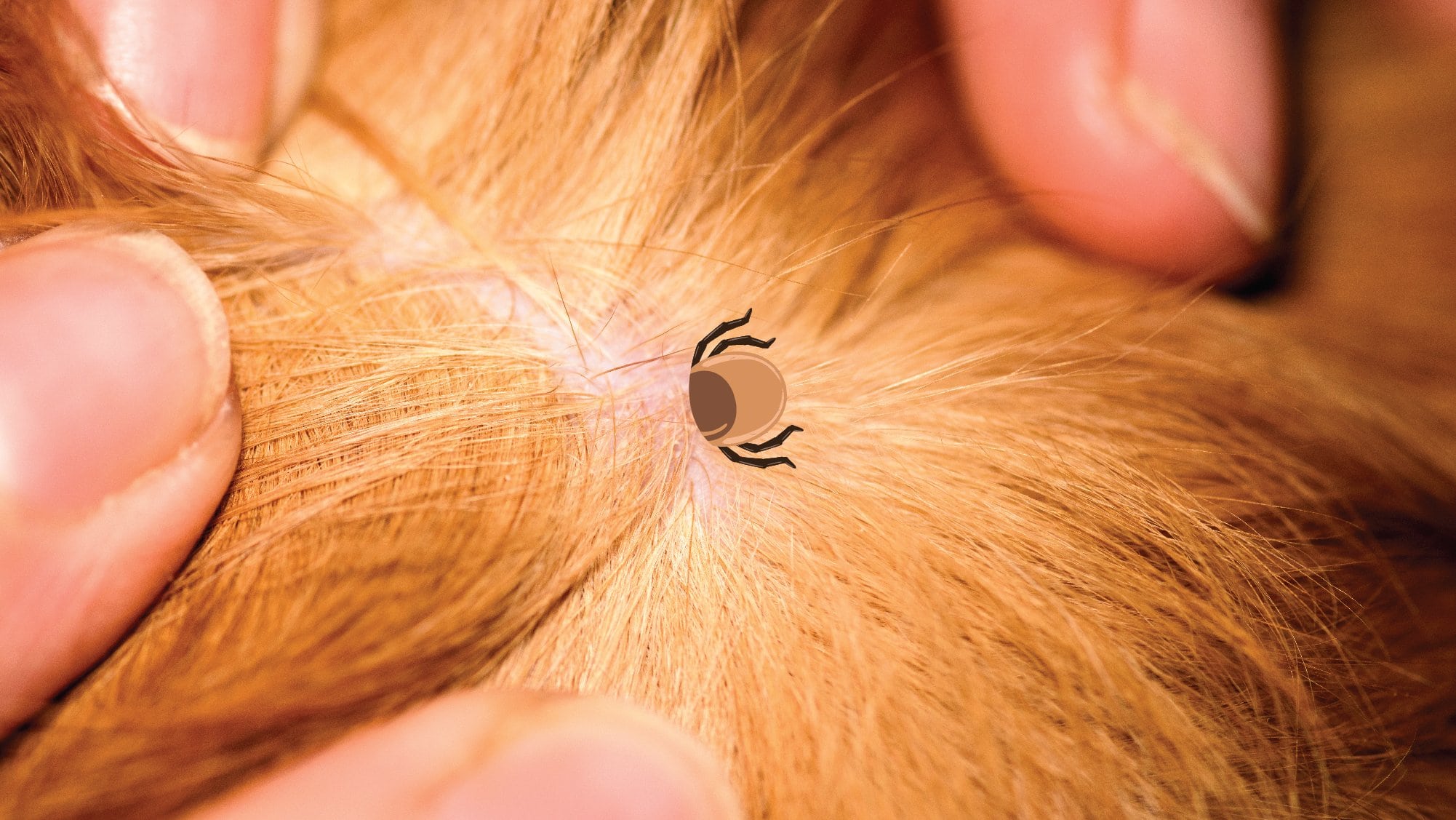Ticks carry many serious diseases that can be transmitted to dogs. This is why protecting your dog from tick bites is critically important.
To help you protect your pup, we will provide you with all the essential information you need to know about treating tick bites on dogs.
Whether you’re looking for information on preventing or treating tick bites at home or antibiotics for tick bites, it’s all covered below.
What Pet Parents Should Know About Ticks
Ticks are egg-shaped parasites that live in long grasses or brush and wait for a host to come near. Tick bites create tiny red bumps similar to a mosquito bite.
When a host (like your pup) is nearby, the ticks can smell them and sense their heat and movement. They wait until the moment is right, then jump onto the host.
Ticks attach to the skin by burying their head and mouthparts into the host’s body. They can remain attached anywhere from a few hours to a few days.

During which time they suck blood from their host and can transmit many diseases through their saliva, including:
Lyme disease
Caused by the bacterium Borrelia burgdorferi, Lyme disease is commonly transmitted to humans and animals, including dogs, through the bite of infected black-legged ticks. The disease can cause sore joints, fever, and damage to the liver and kidneys. In dogs, common symptoms of Lyme disease include fever, lethargy, lameness, swollen joints, and loss of appetite. Luckily, dogs cannot transmit Lyme disease to humans or vice versa.
Ehrlichia canis
A rickettsial organism that infects the red blood cells of dogs, eventually destroying them and causing anemia. The symptoms of Ehrlichia canis in dogs vary widely but may include fever, lethargy, loss of appetite, vomiting, and diarrhea.
Anaplasma
A bacterial infection that can either be asymptomatic or cause fever, lameness, and anorexia (loss of appetite). Anaplasma infection can lead to bleeding disorders and organ damage in severe cases.
Prevention is critical to protecting your furry friend from the conditions above. Keep your dog away from wooded areas with tall grass to reduce their exposure to ticks. Also, groom your dog regularly so you can spot and remove any ticks as soon as possible.
Pay special attention to crevices such as between your dog’s toes, armpits, ears, and genital areas, as these are the most likely areas to be bitten. Your veterinarian can advise you on good-quality tick repellants, including collars, pills, and topical treatments (see below for more details).
Home Remedies for Treating Tick Bites on Dogs
If you’re looking for natural ways to treat tick bites on dogs at home, consider the following:
Removing the tick yourself
To remove the tick, wait until your dog is calm and use treats as a distraction. Use tweezers or a tick removal tool and pull the tick straight out of your dog’s skin in one smooth, well-controlled movement.
Check to ensure that you successfully removed the entire head but do not panic if it detached from your pet’s skin, as this is a common occurrence.
Your dog’s body will eventually react against the head, which will then fall out of the skin in a few days, similar to a splinter. Once you remove the tick, wash the areas around the bite with a warm washcloth and anti-bacterial soap.
Apply a cold compress
A cold compress can help reduce any swelling your dog may be experiencing from the tick bite.
Dab a little Neosporin or triple antibiotic ointment on the bite to help prevent infection.
Apply diluted essential oils
Lavender oil, tea tree oil, and peppermint oil have natural antibacterial and anti-inflammatory properties. Dilute a few drops of essential oil with coconut oil or olive oil and apply it to the affected area for a natural way to treat a tick bite.
Antibiotics to Treat Tick Bites on Dogs
If your veterinarian suspects a tickborne illness or your dog tests positive for a tickborne illness, they will likely prescribe an antibiotic, usually doxycycline or minocycline, followed by amoxicillin and azithromycin. The total treatment time for tickborne illness lasts four weeks.
Very rarely, the tick bite itself may become infected as evidenced by local inflammation and swelling with discharge, and different antibiotics may be required. Luckily, most tick bites heal without specific treatment.
When to See a Veterinarian After a Tick Bit Your Dog
If you notice any of the following signs of tick-borne illness in your dog, contact your veterinarian immediately:
- A tick that has been attached for an extended period of time (more than 24-48 hours).
- Signs of illness, such as loss of appetite, fever, lethargy, and joint pain.
- Skin irritation or infection.
- Difficulty breathing, pale gums, or bruising of the skin/gums.
- Blood in urine or stool.
- A tick is still attached, and you can’t remove it.
Frequently Asked Questions
Are tick bites on dogs noticeable?
Tick bites usually appear as small, red bumps on the skin. These small bumps often go undetected by dog owners. So it’s also important to watch for behavioral signs of a tick bite, like sudden itching and scratching, lethargy, and difficulty moving. Other symptoms of tick bites in dogs include inflammation, sores, and scabbing.
What’s the best way to prevent tick bites on my dog?
Your veterinarian will be able to advise you on the best option for your dog:
- Seresto collar: Provides eight months of tick and flea protection and will repel ticks. This option takes 24 hrs to become effective.
- Simparica and Simparica Trio: A monthly pill for tick/flea or tick/flea/heartworm prevention (Trio). This is an excellent option for dogs infested with multiple ticks, as it will begin to kill them within one to two hours. This medication does not repel future ticks and allows them to attach to your dog, potentially transmitting disease.
- Monthly topical treatments: Advantix, Revolution, and Frontline take 24-48 hrs to kill ticks already on your dog, and they do not prevent further ticks from attaching. Once attached, the ticks will die.
Do tick bites lead to serious health problems in dogs?
Tick bites can lead to various health problems in dogs, such as Lyme disease, Ehrlichiosis, Anaplasmosis, Rocky Mountain Spotted Fever, and Babesiosis. These diseases can be asymptomatic or can cause severe health issues. Ticks should be removed from your dog as soon as they are found to reduce the risk of disease transmission.
Do I need to see a vet if my dog gets bitten by a tick?
It’s always a good idea to visit the vet if your dog begins to act ill following a tick bite, but keep in mind that your dog will not test positive for tickborne diseases for at least 6-8 weeks.
If you feel confident removing the tick yourself, that is the best and quickest option, then you should monitor the area for swelling or inflammation. Most tick bites simply scab over and heal on their own.
BetterVet Can Help
Don’t wait until it’s too late. Book an appointment today with BetterVet to ensure your furry friend stays healthy and tick-free. Our experienced veterinarians are here to provide the care and attention your pet deserves.





